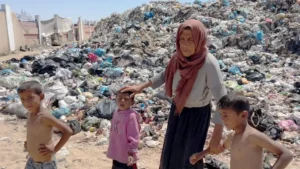‘A slow death’: Gazans live alongside rotting rubbish and rodents

Asmahan al-Masri and 15 relatives live at a camp in Khan Younis, feet away from piles of rubbish
Yolande Knell reports in BBC News on 19 June 2024:
Across the Gaza Strip, in a landscape newly transformed by war, mountains of stinking rubbish pose severe dangers to health and the environment.
“We’ve never lived next to rubbish before,” says Asmahan al-Masri, a displaced woman, originally from Beit Hanoun in the north, whose home is now a wasteland in Khan Younis. “I cry just like any other grandmother would over her grandchildren being sick and having scabies. This is like a slow death. There is no dignity.”
In eight months, more than 330,400 tonnes of solid waste are estimated to have built up in the Palestinian territory, according to the UN and humanitarian agencies working on sanitation.
Sixteen members of the Masri family share a tent in a camp near al-Aqsa University with clouds of flies and sometimes snakes. Stray dogs can roam menacingly nearby. All the residents complain of the constant stench. “The smell is very disturbing. I keep my tent door open so that I can get some air, but there is no air,” Asmahan says. “Just the smell of rubbish.”
Some of the more than one million people who recently fled Israel’s military offensive in the southern city of Rafah have been forced to live in open areas that had already been turned into temporary refuse tips.
“We searched everywhere for a suitable place, but we are 18 people with our children and grandchildren, and we couldn’t find anywhere else where we could stay together,” says Ali Nasser, who recently moved to the al-Aqsa University campsite from his home in Rafah. “The journey here cost us over 1,000 shekels ($268; £212) and now our finances are destroyed. We have no jobs, no income, and so we are forced to live in this dire situation. We suffer from vomiting, diarrhoea, and constantly itchy skin.”
Before the war, years of blockade imposed by Israel and Egypt on Gaza, which was governed by Hamas, had put a severe strain on basic services, such as waste disposal.
The tight restrictions for what Israel said were security reasons on what could enter the territory meant there were insufficient rubbish trucks, a lack of equipment for sorting and recycling household waste and for disposing of it correctly.
Since the deadly 7 October Hamas-led attacks, Israel’s military has blocked access to the border area, which is where Gaza’s two main landfill sites are located. One in Juhr al-Dik previously served the north, and another, in al-Fukhari, served the central and southern areas.
